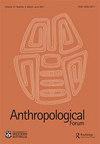A Kauapapa Māori Intervention on Apology for LDS Church's Racism, Zombie Concepts, and Moving Forward
IF 0.7
3区 社会学
Q3 ANTHROPOLOGY
引用次数: 0
Abstract
This intervention paper, based on the Kaupapa Māori writing inquiry, aims to offer an alternative path forward to the idea that The Church of Jesus Christ of Latter-day Saints should apologise for its racism. It argues that an apology is redundant to the Indigenous World. The goal is for better Church-Indigenous relations in the face of racism rooted in The Book of Mormon, Church Policy, doctrine, teachings, and theology. The author develops a positionality and outlines mahi tuhituhi as a Kaupapa Māori (post) qualitative writing inquiry. The Author then moves to contextualise these issues by framing them with what sociologists describe as Zombie Concepts. A brief overview of the Book of Mormon and its significance in Mormonism is provided. Following that, an understanding of the connection between Aileen Moreton-Robinson's white possessive and Lamanitism is provided. Hagoth and his relationship with Tāngata Moana (Māori and Pacific Peoples) is then addressed. Recent remarks by Thomas Murphy to help readers understand the racism in the Book of Mormon. Other issues for Indigenous Peoples are highlighted, with an emphasis on anachronisms and the Book of Mormon's plagiarism. The investigation then shifts to provide Veracini's commentary on settling to build relationality is discussed from the viewpoint of Aotearoa New Zealand. A discussion of the issues is followed by an outline of the research's consequences, which include seven issues that need to be addressed as part of the relationality building in order to create a collaborative future values-based project to move Church-Indigenous relations forward in a positive way.考阿帕帕Māori对摩门教会种族主义道歉的干预,僵尸概念,并向前迈进
本文以Kaupapa Māori写作调查为基础,旨在为耶稣基督后期圣徒教会应为其种族主义道歉的观点提供另一种途径。它认为道歉对土著世界来说是多余的。我们的目标是在面对根植于摩尔门经、教会政策、教义、教导和神学的种族主义时,改善教会与原住民的关系。作者发展了一个定位,并概述了mahi tuhituhi作为一个考帕帕Māori(后)定性写作调查。然后,作者将这些问题置于社会学家所描述的“僵尸概念”的框架中。简要概述了摩门经及其在摩门教中的意义。在此基础上,对艾琳·莫顿-罗宾逊的白人占有与拉曼主义之间的联系进行了理解。哈哥特和他与Tāngata莫阿娜(Māori和太平洋人民)的关系。托马斯·墨菲最近的评论帮助读者理解《摩门经》中的种族主义。原住民的其他问题也被强调,重点是时代错误和摩尔门经的抄袭。然后,调查转向提供Veracini的评论,从新西兰的Aotearoa的角度来讨论建立关系。对这些问题的讨论之后是对研究结果的概述,其中包括七个需要作为关系建设的一部分来解决的问题,以便创建一个基于价值观的未来合作项目,以积极的方式推动教会与土著的关系。
本文章由计算机程序翻译,如有差异,请以英文原文为准。
求助全文
约1分钟内获得全文
求助全文
来源期刊

Anthropological Forum
ANTHROPOLOGY-
CiteScore
3.60
自引率
10.00%
发文量
14
期刊介绍:
Anthropological Forum is a journal of social anthropology and comparative sociology that was founded in 1963 and has a distinguished publication history. The journal provides a forum for both established and innovative approaches to anthropological research. A special section devoted to contributions on applied anthropology appears periodically. The editors are especially keen to publish new approaches based on ethnographic and theoretical work in the journal"s established areas of strength: Australian culture and society, Aboriginal Australia, Southeast Asia and the Pacific.
 求助内容:
求助内容: 应助结果提醒方式:
应助结果提醒方式:


